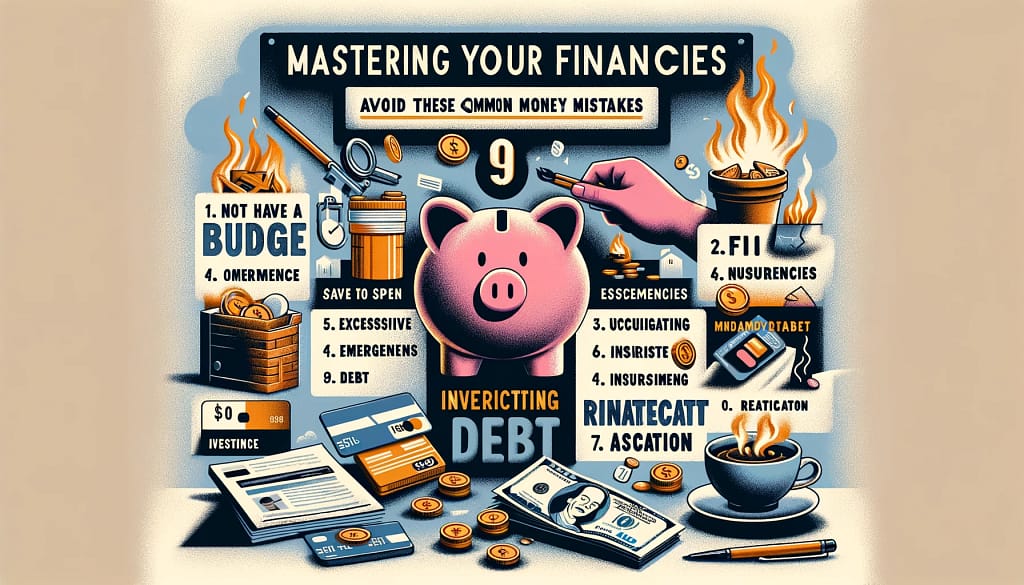
In today’s complex financial landscape, navigating personal finances can be daunting. From budgeting to investing, there are numerous aspects to consider to ensure financial stability and success. In this guide, we’ll explore the top 10 most common financial mistakes individuals make and provide practical insights on how to avoid them.
Lack of Budgeting: Tracking Expenses Properly
One of the most common financial mistakes is not tracking expenses properly, leading to a lack of budgeting. Without a clear understanding of where money is being spent, it’s challenging to manage finances effectively. By implementing a detailed budgeting system and tracking expenses diligently, individuals can gain control over their finances and make informed spending decisions.
Ignoring the Importance of an Emergency Fund
An emergency fund serves as a financial safety net during unexpected events such as job loss, medical emergencies, or car repairs. Despite its importance, many individuals neglect to establish an emergency fund, leaving them vulnerable to financial hardship. By prioritizing savings and setting aside funds specifically for emergencies, individuals can protect themselves from unexpected financial setbacks.
Accumulating High-Interest Debt
High-interest debt, such as credit card debt, can quickly spiral out of control if not managed properly. Accumulating debt not only leads to financial strain but also incurs significant interest payments over time. To avoid this common financial mistake, individuals should prioritize debt repayment and avoid taking on additional high-interest debt whenever possible.
Overspending on Non-Essentials
In today’s consumer-driven society, it’s easy to overspend on non-essential items such as dining out, entertainment, or luxury goods. However, overspending can quickly deplete financial resources and hinder long-term financial goals. By distinguishing between needs and wants and practicing mindful spending habits, individuals can avoid falling into the trap of overspending and prioritize financial stability.
Neglecting Retirement Savings
Planning for retirement is essential, yet many individuals neglect to save enough for their golden years. Failing to prioritize retirement savings can result in financial insecurity during retirement and force individuals to rely solely on social security or other sources of income. By starting early and consistently contributing to retirement accounts such as 401(k)s or IRAs, individuals can build a robust nest egg for retirement.
Avoiding Investment Opportunities
Investing is a critical component of wealth building, yet many individuals shy away from it due to perceived risks or lack of knowledge. However, avoiding investment opportunities means missing out on potential growth and long-term financial security. By educating themselves about different investment options and seeking guidance from financial advisors, individuals can overcome their fear of investing and build a diversified investment portfolio.
Lack of Insurance Coverage
Insurance plays a crucial role in protecting individuals and their assets from unforeseen events such as accidents, illnesses, or natural disasters. However, many individuals neglect to obtain adequate insurance coverage, leaving themselves vulnerable to financial losses. By assessing their insurance needs and investing in policies such as health insurance, life insurance, and property insurance, individuals can safeguard their financial well-being against unexpected risks.
Financial Illiteracy: The Importance of Financial Education
Financial literacy is the cornerstone of sound financial decision-making, yet many individuals lack basic financial knowledge. Without understanding concepts such as budgeting, investing, and managing debt, individuals are susceptible to making costly financial mistakes. By investing in financial education through books, courses, or workshops, individuals can empower themselves to make informed financial decisions and achieve financial success.
Failing to Plan for Taxes
Taxes are an inevitable part of life, yet many individuals fail to plan for them adequately. Ignoring tax implications can result in unexpected tax bills or missed opportunities for tax savings. By understanding relevant tax laws and seeking guidance from tax professionals, individuals can optimize their tax strategies and minimize their tax liabilities.
Overlooking Estate Planning
One often overlooked aspect of financial management is estate planning. Failing to create a comprehensive estate plan can lead to complications and disputes among beneficiaries after one’s passing. By creating a will, establishing trusts, and designating beneficiaries for assets, individuals can ensure their wishes are carried out and their loved ones are provided for in the event of their death. Estate planning also includes considerations for healthcare directives and powers of attorney, which are essential for managing affairs in case of incapacity. By addressing estate planning needs proactively, individuals can protect their assets and provide peace of mind for themselves and their families.
Avoiding Financial Pitfalls for a Secure Future
In conclusion, avoiding the top 10 most common financial mistakes is crucial for achieving financial stability and success. By prioritizing budgeting, saving, investing, and financial education, individuals can pave the way for a secure financial future. By learning from these common financial mistakes and implementing practical strategies to avoid them, individuals can build a solid foundation for long-term financial health and prosperity.
FAQs
- What are the consequences of not budgeting properly? Without proper budgeting, individuals may overspend, accumulate debt, and struggle to meet financial goals, leading to financial stress and instability.
- Why is it essential to have an emergency fund? An emergency fund provides financial security during unexpected crises, such as job loss or medical emergencies, preventing individuals from falling into debt or financial hardship.
- How can individuals avoid high-interest debt? By prioritizing debt repayment, avoiding unnecessary borrowing, and practicing responsible spending habits, individuals can prevent the accumulation of high-interest debt.
- What is the significance of retirement savings? Retirement savings ensure financial security and stability during one’s later years, allowing individuals to maintain their lifestyle and cover expenses after exiting the workforce.
- Why is investing important for financial growth? Investing in diversified portfolios allows individuals to grow their wealth over time, outpacing inflation and achieving long-term financial goals.
- Why is financial literacy crucial? Financial literacy empowers individuals to make informed financial decisions, protect themselves from scams, and build a solid foundation for financial success.